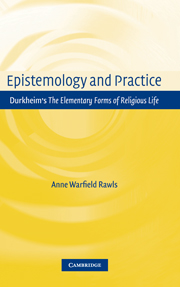Book contents
- Frontmatter
- Contents
- Acknowledgments
- Introduction
- 1 Durkheim's Outline of the Argument in the Introductory Chapter
- 2 Durkheim's Dualism: an Anti-Kantian, Anti-Rationalist Position
- 3 Sacred and Profane: the First Classification
- 4 Totemism and the Problem of Individualism
- 5 The Origin of Moral Force
- 6 The Primacy of Rites in the Origin of Causality
- 7 Imitative Rites and the Category of Causality
- 8 The Category of Causality
- 9 Logic, Language and Science
- 10 Durkheim's Conclusion Section iv: Logical Argument for Social Origin of the Categories
- Conclusion
- Bibliography
- Index
10 - Durkheim's Conclusion Section iv: Logical Argument for Social Origin of the Categories
Published online by Cambridge University Press: 22 September 2009
- Frontmatter
- Contents
- Acknowledgments
- Introduction
- 1 Durkheim's Outline of the Argument in the Introductory Chapter
- 2 Durkheim's Dualism: an Anti-Kantian, Anti-Rationalist Position
- 3 Sacred and Profane: the First Classification
- 4 Totemism and the Problem of Individualism
- 5 The Origin of Moral Force
- 6 The Primacy of Rites in the Origin of Causality
- 7 Imitative Rites and the Category of Causality
- 8 The Category of Causality
- 9 Logic, Language and Science
- 10 Durkheim's Conclusion Section iv: Logical Argument for Social Origin of the Categories
- Conclusion
- Bibliography
- Index
Summary
In Section iv of his Conclusion, Durkheim takes up the origin of the categories of the understanding as a final question of logic, but treats this as a separate question from the origin of logic in general addressed in Section iii. The discussion of the categories here is important because, given the general tendency to overlook the relevance of the central chapters, scholars have tended to treat this discussion as Durkheim's argument that the categories have a social origin. It is essential to understand that in this last section, Durkheim does not make an argument that the categories do have a social origin. He does not need to, as he has made that argument already in the central chapters. What he argues here is that the categories would not be suited to, their purpose if they did not have a social origin and therefore must, for logical reasons, have a social origin. This is a second logical argument entirely different from, and not intended to be taken in place of, the demonstration of their empirical origin in the central chapters. Unfortunately, as he does many times in the text, for instance with regard to Smith's objection, Durkheim follows one argument with another that is quite different from the first. The argument that the categories need to have a social origin is not the argument that they do have a social origin expressed differently. It is a different argument.
- Type
- Chapter
- Information
- Epistemology and PracticeDurkheim's The Elementary Forms of Religious Life, pp. 301 - 315Publisher: Cambridge University PressPrint publication year: 2005



